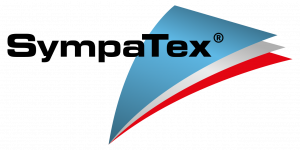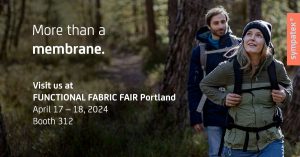 UNTERFÖHRING, Germany — April 17, 2024 — Sympatex, a global provider of sustainable membranes, exhibits its latest innovations at Functional Fabric Fair in Portland (booth 312), from April 17th – 18st, 2024.
UNTERFÖHRING, Germany — April 17, 2024 — Sympatex, a global provider of sustainable membranes, exhibits its latest innovations at Functional Fabric Fair in Portland (booth 312), from April 17th – 18st, 2024.
Renowned for its commitment to environmental responsibility and high-performance materials, Sympatex presents a diverse range of sustainable solutions to meet the demands of transferring the linear textile industry towards a circular one. PFAS freedom also plays a decisive role for Sympatex.
Sympatex acknowledges the risks associated with PFAS and has been diligently working for years to strive for a ban on PFAS from all non-essential applications, both through technological advancements and public advocacy efforts.
The 100% PES waterproof Sympatex membrane has been PFAS-free since the company’s establishment in 1986, as well as the raw materials utilized. Since 2008, Sympatex has begun with a transition towards a fluorine-free C0 DWR, which has consistently demonstrated excellent water repellency and has undergone continual technical enhancement. In the brands’ commitment to delivering PFAS-free* products, Sympatex conducts annual tests in accordance with OEKO-TEX® STANDARD 100, as well as random sampling throughout the year. As anticipated, recent test reports, as well as those from previous years, confirm the absence of PFAS residues in all Sympatex membranes.
With circularity as a mission, Sympatex introduces cutting-edge technologies designed to minimize environmental impact while adding further benefits on performance.
 The booth is set to unveil three new products, a plain weave, a dobby and a twill, all sourced from e.dye®.
The booth is set to unveil three new products, a plain weave, a dobby and a twill, all sourced from e.dye®.
e.dye® is a solution dyed polyester color system with over 5,000 colors and a sophisticated color-matching process for garment textiles. Solution dyeing consumes up to 60% less water, uses up to 90% less chemicals and produces fewer CO2 emissions.
“Working together with e.dye® is a paradigm shift in textile dyeing”, said Kim Scholze, CSO Sympatex.
“Solution dyeing has become a prominent topic in the textile sector, driven by multiple compelling factors. To reduce environmental impacts during production, the advent of the new dyeing process signals a promising shift for the industry at large. In the quest for a more eco-friendly planet, solution dyeing exemplifies how technology can offer innovative solutions to meet the demand for leaving less traces on the planet. Therefore, we are very proud of our cooperation with e.dye®”, added Scholze.
“Because e.dye® actually puts the color inside the yarn, adding the new products to our portfolio gives us three major advantages. Saving water, producing less CO2, using less chemicals. Moreover, since the pigment becomes an inherent component of the yarn (in contrast to traditional processes where the yarn is produced and then colored), solution dyeing yields fibers with exceptional color fastness. These fibers resist bleeding or fading even with prolonged use or exposure to sunlight. Since there is no dyeing process, which has many different influencing factors on colour accuracy, reproducibility is guaranteed with dope dyed goods when reordering”, said Anja Palic, Product Management Sympatex.
Leveraging its expertise in eco-friendly production methods and materials, Sympatex showcases the new article Tokyo Fiber2Fiber Spring AS.
With Tokyo Fiber2Fiber Spring AS Sympatex presents a sustainable alternative to traditional bottle recycling with its innovative solution called Fiber2Fiber (F2F). The featured product comprises a 100% Fiber2Fiber first layer fabric. This groundbreaking F2F yarn is crafted from chemically recycled pre- and post-consumer waste, including discarded garments and cutting scraps. The development of this laminate, alongside other initiatives, underscores Sympatex’s commitment to closing the textile loop and promoting a circular economy. Tokyo Fiber2Fiber Spring AS is specifically tailored for use in functional garments within the outdoor and sportswear industry, offering both performance and sustainability.
By 2027, the European Commission is anticipated to enforce minimum quotas on the utilization of recycled plastic components in new products. These quotas are set to become obligatory for the plastics processing industry, with expected rates ranging between 15 and 30 percent. This regulatory shift will necessitate adaptation within the plastics processing sector to incorporate a higher proportion of recycled fibers in production. Consequently, there will be a significant surge in demand for premium-quality recycled plastic. This surge in demand prompts fabric manufacturers to explore alternatives to conventional polyester sourced from plastic bottles.
Functional Fabric Fair Spring is an exclusive sourcing destination tailored to those at the forefront of the outdoor, lifestyle and activewear industry for textiles, footwear and accessories. Explore cutting-edge materials that redefine the future of performance fabrics. This event showcases the latest products and technologies that will be available to hit the market, giving you a sneak peek into the trends shaping the 2025/2026 Spring season. Crafted by the industry for the industry. This is a trade-exclusive event that is open to verified designers, product, purchasing, material or sustainability managers and others.
Posted: April 17, 2024
Source: Sympatex Technologies GmbH




